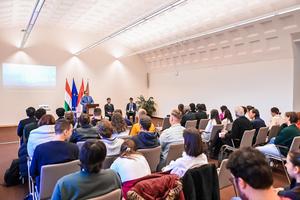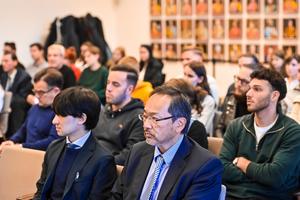Tomohisa Takei, who served as the Chief of Staff of the 32nd Maritime Self-Defense Force of Japan, spoke about how the Ukrainian war and its escalation could affect the Far East.
András Bartók, instructor at the Faculty of Public Governance and International Studies (FPGIS) of the Ludovika University of Public Service (LUPS), presented the retired admiral's career, and then Péter Krisztián Zachar, Vice-Dean of International Affairs at FPGIS, stated in his introduction that Tomohisa Takei, who served as the 32nd Chief of Staff of the Japan Maritime Self-Defense Force, spoke about the impact of the Ukrainian war and its escalation on the Far East.
Péter Krisztián Zachar explained that Japan and Hungary have close ties in almost every aspect of life, whether it is economics, culture, or social life. "I am very pleased to have the opportunity to listen to a distinguished expert's lecture on geopolitics and security policy," he emphasized. He believes it is important to pay attention to the direction of regional and global economic and military narratives in today's world. The Deputy Dean thinks it is crucial to understand Japan's geopolitical thinking in this situation, especially because our country has many connections with Japan.
"Japan today – besides being an important partner for Hungary – is also a global economic force with significant trade and investment presence in the region," emphasized Péter Krisztián Zachar. The Vice-Dean detailed that the university's students participate in Japanese exchange programs and also go to the island nation with scholarships. Péter Krisztián Zachar believes that during the crisis, the partnership between countries becomes even more valuable, acting as a kind of bridge. The Vice-Dean added that mutual relations with Japan are particularly important for the university. This provides an opportunity for scientists and experts to discuss topics related to international relations, economics, and the establishment of global peace and security.
In his presentation, Tomohisa Takei explained that the war in Ukraine has brought about structural changes in the world, and the conflict leads to the tripolarization of the global structure. The former Chief of Staff also touched upon Hamas, which, in his view, also disrupts the global structure and causes regional chaos. Tomohisa Takei sees that the aforementioned structural changes also affect security in East Asia, considering, among other things, the tense relations between China and Taiwan, the accelerated development of North Korean reconnaissance satellites, and the potential deterioration of Sino-Russian relations. "Russia falls out of great power status, and China becomes a smaller partner," highlighted Tomohisa Takei.
"The hegemony of the United States is relatively narrowing in East Asia," emphasized the expert, adding that countries dependent on the USA should collaborate with Washington tightly to strengthen their deterrent capabilities. The expert also spoke about China in his presentation: he believes that the country's fundamental security policy is to have a military force that cannot be underestimated by neighboring countries and, preferably, to expand its influence by extending its borders. He sees the only way for a small country or continent to preserve its independence is to form alliances with multiple countries and, if possible, establish a self-defense system.
Text: Éva Harangozó
Photo: Dénes Szilágyi







